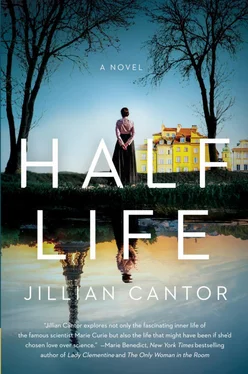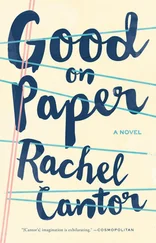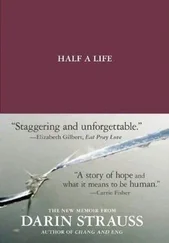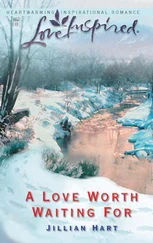Both Marie and Marya say, “My body was not built to carry a baby.” But how is pregnancy ultimately different for each of them, based upon their circumstances? Who becomes a better mother, Marya or Marie? How and why does Klara turn out differently than Irene and Ève?
In Marie’s storyline, Leokadia marries Kaz but gives up her piano career. In Marya’s, Leokadia pursues piano professionally and never marries, but she is still drawn to Kaz. Which life is a better life for her? Why do you think she still finds her way to Kaz in both storylines?
Near the end, Marya clings to her sisters’ hands and says they are “three old women, forever connected to one another by blood and by love. And yes, by science, too.” Marie is similarly connected to her sisters at the end of her life. But Bronia’s and Hela’s lives turn out drastically different in the two storylines. Compare and contrast their lives in both stories. Which storyline is better for Bronia? For Hela? How do Marya’s actions irrevocably change her sisters’ lives, in ways both good and bad?
From Poland to Paris to the rocky cliffs of Brittany to the front lines of World War I—what role does setting play in the novel? How does the setting help inform and shape Marya’s life differently from Marie’s?
In the very end, Ève plays piano for Marie and Klara plays it for Marya. What role does music play both here and throughout the book? How is the piano both different and the same for Marie and for Marya?
The book opens and closes with Marie on her deathbed, examining the choices she made in her personal life: love, marriage, education, motherhood. But in the very end she thinks that radium is everything, the only thing . What do you think she means by this? What is the importance of radium in both Marie’s life and her death? How is this different in Marya’s story?
Marya thinks that half-life is such a funny term, so unscientific . While Marie thinks in the end that the half-life of radium is 1,600 years, that her radium will long outlive her. Why is the novel called Half Life ? Discuss both the scientific and personal significance of that term for Marya and for Marie. 
Read On
Excerpt from In Another Time
PROLOGUE
Hanna, 1958
I haven’t told Stuart the whole truth about where I came from. Because for one thing, he wouldn’t understand. How could he, when I don’t really understand it for myself? And for another, even if I did tell him, he wouldn’t believe it. He would frown, and his blue eyes would soften, crinkle just around the edges, illuminating both his age and his kindness. Oh, my dear , he might say, as Sister Louisa once did, after I’d stumbled into the last-standing church in Gutenstat, freezing cold and sick with thirst and hunger.
Sometimes, even now, I wonder if I made it all up. If Max, too, was just a dream, a figment of my imagination. Impossible, like all the rest of it.
You have been through a trauma , Sister Louisa reminded me, after I first saw the doctor in Berlin. Your mind plays tricks to protect you.
And it was a strange thing, but when Sister said it, I almost believed her. How could she be wrong, after all? This nun with her wrinkly face, pale as snow, and light gray eyes, with her habit and her soft smile. She wouldn’t lie. Then she pointed to my violin in my hand. Can I hear you play, my dear?
She touched my Stradivari. I’d had it since my sixteenth birthday, an extravagant present from Zayde Moritz, just before he passed. I was holding it when I came to in the field. I’d held it playing for Max, in the bookshop once, too. And sometimes the only thing to me that still feels real, even now, is my violin.
I have played the violin since I was six years old, and it has always felt a part of me, another limb, one that is necessary and vital to my daily survival. My violin connects my present and my past, my dreams and my reality. My fingers move nimbly over the strings, my mind forgetting all I’ve lost or forgotten. There is only the music that is my constant companion. Nothing but the music. Not Stuart. Not Max. Not now. Not the past, either.
“Hanna,” Stuart interrupts me today. I’ve etched the date, November 6, 1958, in pencil at the top of my music, so I know it is real, so I don’t forget. I do this every single day and have since I was living in London with Julia. While I sometimes still forget how old I am now, my fingers do not move as they used to. Some days my knuckles swell, and I must cover them in bags of ice when I get home after practice. I hide this from Stuart, too, like so much else.
Today, I’m practicing at the conservatory, as I do every day after the group rehearsal. The orchestra will tour again in the spring. We’ll go around Europe this time, playing Bach and Vivaldi and Holst. London, Paris, Berlin . As first chair violinist, I must play everything right, everything perfect. Though I already know all the music well, it is not enough. I have to breathe it, too. It has to sink into my skin, into my memory, so I will never ever forget it, a sweet perfume that lingers on and overtakes all my senses.
When Stuart walks in, I rest my violin on my knee and smile at him. Dear, sweet Stuart who brought me into the orchestra’s fold five years ago. He’s ten years older than I am and would like nothing more than to marry me. Which he has told me on more than one occasion. But I laugh and pretend as though I believe him to be joking, though we both know he’s not. You’re an old soul, he told me once, as if trying to explain away our age difference. It was only then that I’d thought: Maybe Stuart really does know me?
“Hanna,” he says now. “You have a friend here to see you.”
My world in New York City is a bubble. Rehearsal and practice. I live alone in a one-bedroom apartment in Greenwich Village, and though I am friendly with nearly everyone in the orchestra, I wouldn’t call any of them dear friends. Only Stuart. And it’s only because he thinks he loves me, thinks he understands me. “It must be some mistake,” I tell him, bringing the violin back to my chin.
“No mistake,” Stuart says. “He asked for Hanna. He said the ‘girl who plays violin like fire.’” Stuart laughs. His eyes crinkle. He is both amused and stricken by the accuracy of the description.
Once, so many years ago, when I was insisting I would have to give it all up, that I had ruined everything, Max had told me that I would have other auditions. Other orchestras. And you can’t give up, he’d told me. You play the violin like fire, Hanna. You can’t give up on your fire. 
Praise for In Another Time
“ In Another Time returns readers to the place for which Jillian Cantor is known and adored: the heroism and heartbreak of the Second World War…. With her bracing prose and unflinching eye, Cantor catches us up in the sweep of history and reminds us of the interminable power of the human bond and the moments that can last a lifetime.”
—Pam Jenoff,
New York Times bestselling author of
The Orphan’s Tale
“Jillian Cantor’s In Another Time is a love song to the most powerful of all human emotions: hope. It is the story of Max and Hanna, two star-crossed lovers fighting to stay together during an impossible moment in history. It is gripping, mysterious, romantic, and altogether unique. I was enchanted by this beautiful, heartbreaking novel.”
Читать дальше










